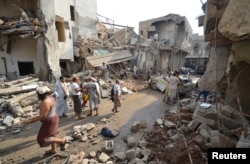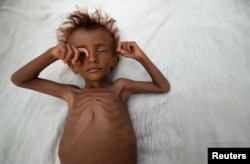A senior U.N. official says humanitarian agencies will take advantage of a 72-hour cease-fire in Yemen to rush life-saving aid to tens of thousands of people in areas that have been cut off by the conflict for a long time. The cease-fire is to go into effect Wednesday night.
The U.N. Humanitarian Coordinator in Yemen says the window for delivering aid is very slim and limited to areas where the fighting has stopped.
Speaking on a telephone line from the capital, Sana’a, Jamie McGoldrick tells VOA the fighting is still going on in many areas and he does not expect the cease-fire to kick in throughout the country at the stroke of midnight.
“As you know, in any crisis as you come towards the cessation of hostilities or peace talks, there is always an intensification of fighting. And, even this morning in Sana’a, we had airstrikes," said McGoldrick. "So I think people will use this, the gap between now and the cessation of hostilities to try and ramp up or get themselves in a different position, and especially as we move, hopefully toward peace talks.”
The United Nations reports 80 percent of Yemen’s 24 million people are in need of humanitarian aid. It says the formal economy has all but collapsed. Unemployment is massive.
It says 14 million people are short of food and going hungry. It adds three million people, mostly children under five, need nutrition assistance. This applies especially for the nearly 1.3 million children who are acutely malnourished.
McGoldrick says 72 hours is not a lot of time. So aid agencies will deliver relief supplies that are stocked in warehouses close to areas that have been out of reach for a long time.
“If it is only 72 hours, we have got to be realistic. We will not get much done in that time beyond what we are doing already," said McGoldrick. "We might be able to enter some pockets, which have been cut off for some time. In terms of the widespread ability to respond, it is not going to be something we can do easily. We are asking for this to be open-ended. We are asking for this to be a long, permanent and lasting cease-fire.”
McGoldrick says a long-lasting break in Yemen’s civil war could enhance prospects for peace. In the meantime, he says aid agencies are in desperate need of money to carry out their life-saving operations. He says the year is almost over, yet the United Nations has received less than half of the $1.63 billion dollars it needs for 2016.






